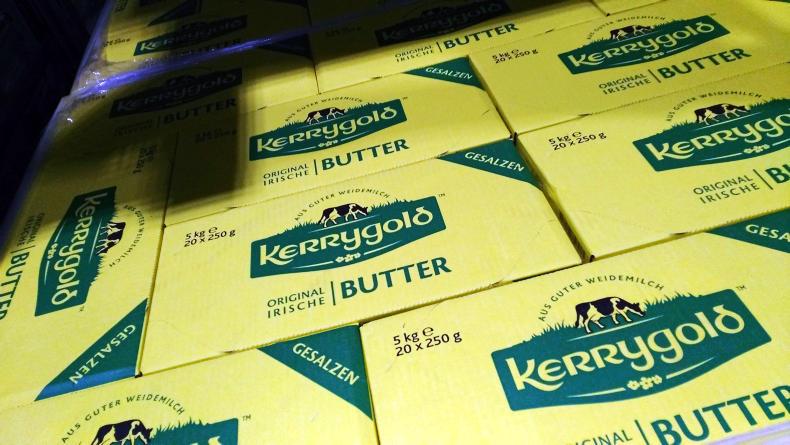Last week we saw Glanbia Ireland announce it was launching its new consumer brand, Truly Grass Fed, into the US market. While its initial focus will be on cheese, the company has ambitions to grow it beyond cheese and into butter. Farmers may shrug their shoulders and say so what or fair play to Glanbia for driving on Irish dairy exports and the grass-fed message. However, there may be serious risks associated with this move that farmers need to pay close attention to.
This move marks a breakaway by Glanbia from a model that has served the Irish dairy industry well for the best part of 60 years. Ornua, formerly the Irish Dairy Board, was set up with the core remit to market Irish dairy abroad. Over the years, the industry has evolved. Ornua now handles some 60% of Irish dairy exports with the balance marketed directly by the individual co-ops that sit around the table.
Glanbia believes that to capitalise on the growing segment of consumers who want a healthy, natural, GM-free dairy product now is the time to launch this new brand into the US. It believes there is a premium to the Kerrygold brand and that by bringing another product to market it can grow the category and tap into this segment of consumers.
Kerrygold success
Today Kerrygold is on track to become Ireland’s first $1bn food brand due to phenomenal success in large consumer markets such as Germany and the US. In the US, it is now the number one imported butter brand and the number two overall butter brand. The brand has been successful because it personifies Ireland and everything Irish farming stands for – high-quality grass-based family farming that has a unique colour and taste.
The Kerrygold brand is also a lesson in added value. The US consumer is willing to pay up to 50% more for Kerrygold. It has been the catalyst for much of the growth we have seen in our indigenous organisations processing milk around the country. It has catapulted them to the level today and allowed many to survive.
Risks
While it is admirable that Glanbia is trying to grow the natural grass-fed category and increase volumes of Irish dairy into the US, it does come with associated risks.
The biggest concern for the industry is that a new brand may cannibalise sales of Kerrygold, where the new brand is sold at a discount to Kerrygold. This is already evident in two US supermarkets where Truly Grass Fed cheese, in order to gain a foothold in the market, is on sale at a discount to the Ornua brand.
In order to defend its market-leading position, Kerrygold may discount its price. This ultimately destroys value for the farmer.
For many years, we have seen this happen in own-label liquid milk. More recently it has started in the infant formula sector, where co-op competition on price to win contracts is seeing high-grade infant formula ingredients being sold to large multinationals for close to commodity prices.
However, a clear difference with Kerrygold and a new co-op-owned brand such as Truly Grass Fed is that the co-ops own these brands rather than a multinational company in the case of infant formula. This means Irish farmers can capture a greater share of the value added.
In these examples, the competition between co-ops internationally has been on a business-to-business level. This is the first time where we see the largest shareholder in the Kerrygold brand creating a new brand that could directly compete on the shelf for a similar consumer.
One of the big reasons for the success of Kerrygold has been the co-operation between co-ops by allowing Ornua be the sole marketer of branded Irish dairy products in key markets such as the US and Germany. By launching the Truly Grass Fed brand, Glanbia is making the first significant divergence away from this strategy.
A joined-up approach that has served the industry successfully for the last 50 years is critical to benefit the farmer
In one way, it is not surprising that Glanbia is looking beyond its traditional marketing lines. It is facing a wall of milk over the coming years as its farmers continue to expand.
By doing nothing, more of that milk will end up dried into lower-value commodity powders. Glanbia has identified an opportunity in the growing consumer trend for GM-free grass-fed products which it feels it can capitalise on.
After all, the industry cannot ignore its large competitors such as Arla in Denmark and processors in Germany and their moves to become GM free.
If this forces the Kerrygold brand to evolve to meet new consumer trends, it could be even more successful at creating value for Irish farmers in the long term, which is a good thing.
However, the big risk is the potential for short-term value destruction where two brands that are essentially the same product are competing in a similar market.
While there is nothing wrong with developing more brands that meet changing consumer trends, a joined-up approach that has served the industry successfully for the last 50 years is critical if it is to benefit the farmer.






 This is a subscriber-only article
This is a subscriber-only article










SHARING OPTIONS: